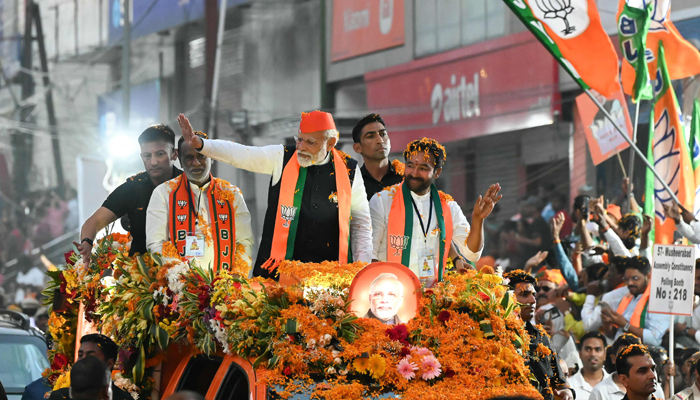The new India
The facade of a secular and tolerant India, one often feted in the West as ‘the world’s largest democracy’, has been crumbling for a while. Since the rise to power of the BJP, there has been growing persecution of religious minorities in India, with Muslims bearing the brunt of the state’s extremist turn. From the violent annexation and suppression of Occupied Kashmir (IIOJK), the passage of discriminatory anti-conversion and cow slaughter laws, encouraging and threatening violence against them, and the banning of the hijab in educational institutions in at least one BJP-led state, the current Indian government’s persecution of the Muslim minority has been relentless.
Other religious minorities such as Sikhs and Christians have not been spared either and this year brought indications that the tendrils of hate are now reaching outside of India’s borders, with the alleged assassination of a Sikh activist in Canada and an attempt to assassinate another Sikh activist in the US by the Indian government.
The United States Commission on International Religious Freedom (USCIRF) commissioner, in a statement released on December 15, points to these acts as a “severe escalation of India’s efforts to silence religious minorities and human rights defenders both within its country and abroad”. The statement also urges the Biden administration to designate India as a ‘Country of Particular Concern’ in light of its government’s severe violations of religious freedom.
Asking an administration that is currently aiding and abetting the genocide of Muslims and Christians in Palestine to take note of the persecution of Muslims and Christians, among others, in another country does not seem to hold much promise. The atrocities Israel has committed in the name of self-defence and security show just how much the US, and their Western allies, are willing to overlook when it comes to the activities of their friends in the Global South. Though the attempt to carry out an assassination on its soil might change some minds in Washington DC, India’s growing economic and geopolitical acts as a formidable buffer when it comes to facing the consequences of its deteriorating human rights record. This is reflected in the fact that current Indian PM Narendra Modi, who was denied a US visa in 2015 for his failure to stop the 2002 Gujarat riots that left nearly 1000 Muslims dead while he was chief minister of the state – indeed many accuse his administration of abetting the anti-Muslim violence – is now being invited to address the US Congress and lead celebrations for the International Day of Yoga at the UN headquarters in New York. Can there be a greater insult to the minorities being persecuted under BJP rule than this about-face in the international attitude towards the alleged ‘butcher of Gujarat’? Sadly, it appears that India’s minorities will, at least for the immediate future, be fighting the battle for their rights without much outside help.
-
 Czech Republic Supports Social Media Ban For Under-15
Czech Republic Supports Social Media Ban For Under-15 -
 Prince William Ready To End 'shielding' Of ‘disgraced’ Andrew Amid Epstein Scandal
Prince William Ready To End 'shielding' Of ‘disgraced’ Andrew Amid Epstein Scandal -
 Chris Hemsworth Hailed By Halle Berry For Sweet Gesture
Chris Hemsworth Hailed By Halle Berry For Sweet Gesture -
 Blac Chyna Reveals Her New Approach To Love, Healing After Recent Heartbreak
Blac Chyna Reveals Her New Approach To Love, Healing After Recent Heartbreak -
 Royal Family's Approach To Deal With Andrew Finally Revealed
Royal Family's Approach To Deal With Andrew Finally Revealed -
 Super Bowl Weekend Deals Blow To 'Melania' Documentary's Box Office
Super Bowl Weekend Deals Blow To 'Melania' Documentary's Box Office -
 Meghan Markle Shares Glitzy Clips From Fifteen Percent Pledge Gala
Meghan Markle Shares Glitzy Clips From Fifteen Percent Pledge Gala -
 Melissa Jon Hart Explains Rare Reason Behind Not Revisting Old Roles
Melissa Jon Hart Explains Rare Reason Behind Not Revisting Old Roles -
 Meghan Markle Eyeing On ‘Queen’ As Ultimate Goal
Meghan Markle Eyeing On ‘Queen’ As Ultimate Goal -
 Japan Elects Takaichi As First Woman Prime Minister After Sweeping Vote
Japan Elects Takaichi As First Woman Prime Minister After Sweeping Vote -
 Kate Middleton Insists She Would Never Undermine Queen Camilla
Kate Middleton Insists She Would Never Undermine Queen Camilla -
 King Charles 'terrified' Andrew's Scandal Will End His Reign
King Charles 'terrified' Andrew's Scandal Will End His Reign -
 Winter Olympics 2026: Lindsey Vonn’s Olympic Comeback Ends In Devastating Downhill Crash
Winter Olympics 2026: Lindsey Vonn’s Olympic Comeback Ends In Devastating Downhill Crash -
 Adrien Brody Opens Up About His Football Fandom Amid '2026 Super Bowl'
Adrien Brody Opens Up About His Football Fandom Amid '2026 Super Bowl' -
 Barbra Streisand's Obsession With Cloning Revealed
Barbra Streisand's Obsession With Cloning Revealed -
 What Did Olivia Colman Tell Her Husband About Her Gender?
What Did Olivia Colman Tell Her Husband About Her Gender?




